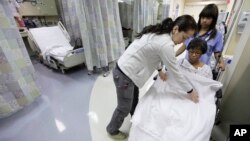The largest union representing nurses across the United States, National Nurses United, says a survey of its members shows most U.S. hospitals are not adequately prepared to deal with Ebola. The diagnosis of a second nurse with Ebola at a Dallas hospital has energized nurses nationwide to demand action.
In a conference call with 7,000 member nurses, National Nurses United Executive Director RoseAnn DeMoro read a letter the organization sent to President Barack Obama, asking him to invoke his executive authority to make hospitals nationwide ready for Ebola.
“Not one more nurse, not one more patient, not one more health care worker should be put at risk due to the lack of health care facility preparedness. The United States should be setting the example on how to contain and eradicate the Ebola virus,” said DeMoro.
According to a survey of members conducted by the union, 85 percent of American hospitals have not provided staff with adequate training on how to deal with Ebola, and 40 percent lack simple safety devices like masks to protect the eyes of nurses working with Ebola patients.
During the call-in session, Yadira Cabrera, a nurse in El Paso, Texas, said hospitals have engaged in more talk about preparedness than concrete action.
“Hospitals may say they are ready, but my experience is that they are not. What we have seen, for example, is that we received training of approximately 10 minutes regarding Ebola and not given an interactive type of training, which is what we have demanded,” said Cabrera.
She said handing someone a pamphlet and referring them to a website is not good enough to prepare nurses to deal with the deadly virus.
Not ready
Nurses from around the country told similar stories, saying that many hospitals are not ready to deal with contaminated bed sheets, clothing and other items that could spread the disease throughout the hospital and beyond.
A caller from New York City said only one large hospital there is fully prepared to handle an Ebola case, and that nurses in many smaller hospitals would be at risk if an Ebola patient were to arrive.
The nurses objected to statements by officials from the U.S. Centers for Disease Control suggesting that the infected nurses in Dallas had breached protocol. They say there was no protocol to breach, and they provided examples of actions taken by hospital officials that put both health care workers and patients at risk.
Among other things, they said the protective gowns and masks were inadequate, that rules on such things as the wearing of protective shields over shoes changed from one day to the next, that the Ebola-infected patient was kept in an emergency room area with other patients and staff for hours before being put in isolation, and that bodily fluid samples from the patient were sent through the hospital’s pneumatic tube system, potentially contaminating it.
The Ebola virus cannot live long in a dry state, but if it is in any fluid it can remain dangerous for hours, even days. Experts say any contact with a fluid containing the virus could cause infection, especially if it occurs at an orifice or wound that would provide entry into the bloodstream.
The CDC has responded to complaints by nurses and others by pledging to send large teams of experts to any U.S. hospital where a new Ebola case emerges.
The World Health Organization says 70 percent of the people who contract the disease die. More than 4,000 people have died so far, mostly in western Africa, but nearly 9,000 have now been diagnosed with the illness. The WHO projects around 10,000 new cases will be appearing every month by December of this year.




